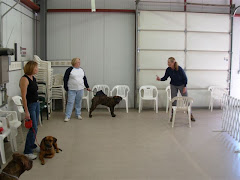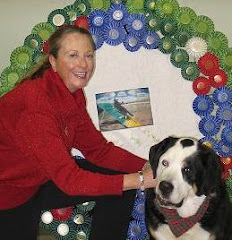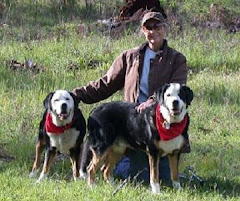
Your dog is getting old. He's dealing with arthritis, deafness, cataracts or blindness. He's unable to go up stairs without your help. He's had some "accidents" in the house. Instinctively, you know there are other problems going on with him...strange new lumps and bumps, occasional nosebleeds, bouts of insomnia, and boniness developing around his hips and spine.
He's not going to last much longer. Unless he dies in his sleep or drops from a heart attack you'll soon have to help him exit the world. But how do you know when the time is right?
In the "old days" on the farm, one of two things would probably happen. The dog would wander off by himself and find a quiet and dignified place to die on his own. Or Grandpappy would take him out back, shoot him in the head, and bury him in the dog's favorite place.
Neither of these methods is socially acceptable anymore. Today we take our dogs to vets to have them euthanized, or--if you're real lucky--you have a vet friend who will come to your house to do it. Once the life leaves your dog's body, you're faced with the choice of burying him or having him cremated. If you choose the latter, you must decide if you want the ashes, and then, whether to keep the ashes in an urn or scatter them at a place of your choosing.
Decisions, decisions. Yet, the most difficult decision of all is WHEN to say goodbye to your friend. When do you decide that enough is enough?
It's not about accidents in the house, nor about difficulty going up steps. It's about the dog telling you, "I've had enough. I'm not having fun anymore." And he WILL tell you, loudly and clearly.
Ask almost anyone who's had to make that big step with their dog, and they'll tell you: "Don't worry about knowing when to do it. When the time is right, the dog will tell you, and you will know. At that moment, you will hasten to honor his request, with no remorse and no regrets. You will feel sorrow for your loss, but gratitude for being able to help your dog with his last wish."
Sometimes the decision we've postponed is made for us if the dog suffers a seizure from which there is no return. If an old dog goes into a coma, suffers shock, and/or has other underlying conditions that could cause another incident later, it may be easier to let them go rather than try veterinary heroics.
But often, the situation doesn't resolve itself that easily, and we are back to making the decision of when to end our dogs' lives. Listen to them. Watch them. Are there facets of their daily lives that still make their eyes sparkle? Do they thump their tails when they hear certain words? Do they still enjoy their food? Do they get excited about certain rituals? And can you manage their pain or discomfort with analgesics? If so, you'd better wait.
Generally speaking, when an old dog stops showing interest in food...when the sparkle leaves the eyes...when he's no longer responsive to the old rituals...when he LOOKS at you and says, "I'm sorry, but I'm too tired. I want to leave," ...that's when you have the right to call your vet.
"Convenience" is not a valid reason for you to euthanize your dog. Yes, he keeps you up every night. Yes, he's frequently incontinent. No, he can't be left alone for his own safety. Yes, his aging makes you uncomfortable and sad. But NONE of these is a good enough reason to have him put down. It may be "inconvenient" for you to watch after any aged family member who has these same problems, but it is your moral responsibility to help them live out their lives until they are ready to leave.
The experience of watching a beloved dog deteriorate mentally and physically is not pleasant. But it's what we LEARN from the experience that matters. Our dogs help us become better humans. We learn patience, tolerance and compassion. We learn to show dignity and respect. We learn to accept aging as an important and natural a part of the life cycle...just as much as birth, growth, and accomplishment.
"...And, my friend, when I am very old, and I no longer enjoy good health, hearing and sight, do not make heroic efforts to keep me going. I am not having any fun. Please see that my trusting life is taken gently. I shall leave this earth knowing with the last breath I draw that my fate was always safest in your hands."--From "A Dog's Plea"


















No comments:
Post a Comment